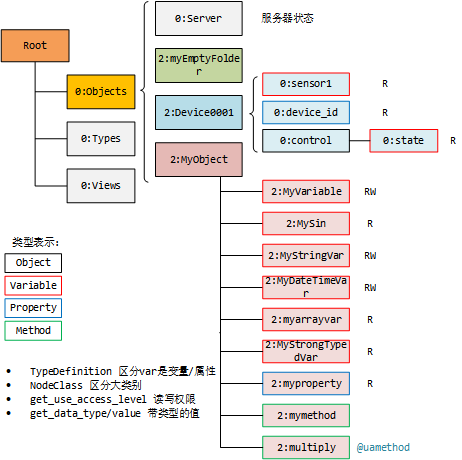OPCUA-Python
pip install opcua
Server
from threading import Thread
import copy
import logging
from datetime import datetime
import time
from math import sin
import sys
sys.path.insert(0, "..")
try:
from IPython import embed
except ImportError:
import code
def embed():
myvars = globals()
myvars.update(locals())
shell = code.InteractiveConsole(myvars)
shell.interact()
from opcua import ua, uamethod, Server
class SubHandler(object):
"""
Subscription Handler. To receive events from server for a subscription
"""
def datachange_notification(self, node, val, data):
print("Python: New data change event", node, val)
def event_notification(self, event):
print("Python: New event", event)
# method to be exposed through server
def func(parent, variant):
ret = False
if variant.Value % 2 == 0:
ret = True
return [ua.Variant(ret, ua.VariantType.Boolean)]
# method to be exposed through server
# uses a decorator to automatically convert to and from variants
@uamethod
def multiply(parent, x, y):
print("multiply method call with parameters: ", x, y)
return x * y
class VarUpdater(Thread):
def __init__(self, var):
Thread.__init__(self)
self._stopev = False
self.var = var
def stop(self):
self._stopev = True
def run(self):
while not self._stopev:
v = sin(time.time() / 10)
self.var.set_value(v)
time.sleep(0.1)
if __name__ == "__main__":
# optional: setup logging
logging.basicConfig(level=logging.WARN)
#logger = logging.getLogger("opcua.address_space")
# logger.setLevel(logging.DEBUG)
#logger = logging.getLogger("opcua.internal_server")
# logger.setLevel(logging.DEBUG)
#logger = logging.getLogger("opcua.binary_server_asyncio")
# logger.setLevel(logging.DEBUG)
#logger = logging.getLogger("opcua.uaprocessor")
# logger.setLevel(logging.DEBUG)
# now setup our server
server = Server()
#server.disable_clock()
#server.set_endpoint("opc.tcp://localhost:4840/freeopcua/server/")
server.set_endpoint("opc.tcp://0.0.0.0:4841/freeopcua/server/")
server.set_server_name("FreeOpcUa Example Server")
# set all possible endpoint policies for clients to connect through
server.set_security_policy([
ua.SecurityPolicyType.NoSecurity,
# ua.SecurityPolicyType.Basic256Sha256_SignAndEncrypt,
# ua.SecurityPolicyType.Basic256Sha256_Sign
])
# setup our own namespace
uri = "http://examples.freeopcua.github.io"
idx = server.register_namespace(uri)
# create a new node type we can instantiate in our address space
dev = server.nodes.base_object_type.add_object_type(0, "MyDevice")
dev.add_variable(0, "sensor1", 1.0).set_modelling_rule(True)
dev.add_property(0, "device_id", "0340").set_modelling_rule(True)
ctrl = dev.add_object(0, "controller")
ctrl.set_modelling_rule(True)
ctrl.add_property(0, "state", "Idle").set_modelling_rule(True)
# populating our address space
# First a folder to organise our nodes
myfolder = server.nodes.objects.add_folder(idx, "myEmptyFolder")
# instanciate one instance of our device
mydevice = server.nodes.objects.add_object(idx, "Device0001", dev)
mydevice_var = mydevice.get_child(["0:controller", "0:state"]) # get proxy to our device state variable
# create directly some objects and variables
myobj = server.nodes.objects.add_object(idx, "MyObject")
myvar = myobj.add_variable(idx, "MyVariable", 6.7)
mysin = myobj.add_variable(idx, "MySin", 0, ua.VariantType.Float)
myvar.set_writable() # Set MyVariable to be writable by clients
mystringvar = myobj.add_variable(idx, "MyStringVariable", "Really nice string")
mystringvar.set_writable() # Set MyVariable to be writable by clients
mydtvar = myobj.add_variable(idx, "MyDateTimeVar", datetime.utcnow())
mydtvar.set_writable() # Set MyVariable to be writable by clients
myarrayvar = myobj.add_variable(idx, "myarrayvar", [6.7, 7.9])
myarrayvar = myobj.add_variable(idx, "myStronglytTypedVariable", ua.Variant([], ua.VariantType.UInt32))
myprop = myobj.add_property(idx, "myproperty", "I am a property")
mymethod = myobj.add_method(idx, "mymethod", func, [ua.VariantType.Int64], [ua.VariantType.Boolean])
multiply_node = myobj.add_method(idx, "multiply", multiply, [ua.VariantType.Int64, ua.VariantType.Int64], [ua.VariantType.Int64])
# import some nodes from xml
# server.import_xml("custom_nodes.xml")
# creating a default event object
# The event object automatically will have members for all events properties
# you probably want to create a custom event type, see other examples
myevgen = server.get_event_generator()
myevgen.event.Severity = 300
# starting!
server.start()
print("Available loggers are: ", logging.Logger.manager.loggerDict.keys())
vup = VarUpdater(mysin) # just a stupide class update a variable
vup.start()
try:
# enable following if you want to subscribe to nodes on server side
#handler = SubHandler()
#sub = server.create_subscription(500, handler)
#handle = sub.subscribe_data_change(myvar)
# trigger event, all subscribed clients wil receive it
var = myarrayvar.get_value() # return a ref to value in db server side! not a copy!
var = copy.copy(var) # WARNING: we need to copy before writting again otherwise no data change event will be generated
var.append(9.3)
myarrayvar.set_value(var)
mydevice_var.set_value("Running")
myevgen.trigger(message="This is BaseEvent")
server.set_attribute_value(myvar.nodeid, ua.DataValue(9.9)) # Server side write method which is a but faster than using set_value
embed()
finally:
vup.stop()
server.stop()
这个服务程序演示了opcua服务端,几乎所有的功能,其中Event部分没有不断发送,所以仅供参考。
下图展示了server端的对象结构

客户端
from IPython import embed
from opcua import Client
class SubHandler(object):
def event_notification(self, event):
print("Event:", event.EventId, event.Time, event.proper_random, event.Message.Text)
def main_c():
url = "opc.tcp://127.0.0.1:4841/freeopcua/server/"
c = Client(url)
try:
c.connect()
root = c.get_root_node()
embed()
except Exception as e:
print("Client Exception:", e)
finally:
c.disconnect()
if __name__ == "__main__":
main_c()
客户端遍历流程
- 1.获取
root下的Objects节点的所有子节点,一般类型都为Object,取一代表为A - 2.获取A的
NodeClass(一般为Object)和TypeDefinition,其中NodeId需要与路径["0:Types","0:ObjectTypes","0:BaseObjectType"]下的类型对照(自定义类型也在内)。 - 3.继续以A为根,遍历子节点,如果时Object继续2,如果是
Variable,NodeId对照["0:Types","0:VariableTypes","0:BaseVariableType"],可以判断是变量(variable,63)还是属性(property,65)。 - 4.对于
Method使用a_root.call_method(a, arg1)调用。对于Variable使用get_value/get_data_value()获取存储的值。如果是Object继续2. - 5.对于
Variable使用access_level获取是否有写权限,如果有set_value可以设置值。
一个比较完美的遍历客户端
from opcua import Client, ua
def brower_child(root):
"""
递归调用遍历,格式化不好做,有深度问题
"""
name = root.get_node_class().name
# print(name)
if name == "Object":
brower_obj(root)
for c in root.get_children():
print(" ", end='')
brower_child(c)
elif name == 'Variable':
brower_var(root)
else:
brower_method(root)
class CurState():
def __init__(self, parent=None, p=None, d=0):
self.parent = parent # unused
self.p = p
self.d = d
def brower_child2(root, max_d=-1, ignore=[]):
"""
栈+循环遍历,非常好用
"""
stack = [CurState(None, root, 0)]
while len(stack):
cur = stack.pop()
name = cur.p.get_node_class().name
print(''.join([' ' for i in range(cur.d)]), end="")
if cur.p.get_browse_name().Name in ignore:
continue
if name == "Object":
brower_obj(cur.p)
if max_d > 0 and cur.d >= max_d:
continue
for c in cur.p.get_children():
stack.append(CurState(cur.p, c, cur.d+1))
elif name == 'Variable':
brower_var(cur.p)
else:
brower_method(cur.p)
def brower_obj(v):
# print(v.get_browse_name())
rw = 'R '
bname = v.get_browse_name()
print("*%2d:%-30s (%-2s, %-23s)" %
(bname.NamespaceIndex, bname.Name, rw, "Object"))
def brower_var(v):
# print(v.get_browse_name())
rw = 'R '
if ua.AccessLevel.CurrentWrite in v.get_access_level():
rw = "RW"
bname = v.get_browse_name()
tv = v.get_data_value().Value
v_show = tv.Value
if len(str(v_show)) > 1024:
v_show = str(v_show[:56]) + "..."
print("-%2d:%-30s (%-2s, %-23s) =>" %
(bname.NamespaceIndex, bname.Name, rw, tv.VariantType), v_show)
def brower_method(v):
# print(v.get_description())
rw = 'C '
bname = v.get_browse_name()
# args = []
# for a in v.get_properties():
# dt = a.get_data_type().NodeIdType.name
# args.append(dt)
print("@%2d:%-30s (%-2s, %-23s)" %
(bname.NamespaceIndex, bname.Name, rw, "Method"))
def main_c():
url = "opc.tcp://127.0.0.1:4841/freeopcua/server/"
c = Client(url)
try:
c.connect()
root = c.get_root_node()
print("rnBrower:")
brower_child2(root.get_child(["0:Objects"]), -1, ["Server"])
except Exception as e:
print("Client Exception:", e)
finally:
c.disconnect()
if __name__ == "__main__":
main_c()
总结
以上为个人经验,希望能给大家一个参考,也希望大家多多支持IT俱乐部。

